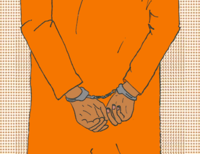Honoring Nelson Mandela
Mandela was an inspiration to people fighting for freedom around the world, and one of the main inspirations for my own prison activism.
by Peter Wagner, December 5, 2013

Nelson Mandela (1918-2013) was a South African freedom fighter and one of the longest held political prisoners in the world. He led the fight to abolish Apartheid and was elected President in the first multi-racial election in 1994. This photo was taken that same year when he revisited his prison cell at the infamous Robben Island (Photo: Getty Images).
Nelson Mandela has died at the age of 95. He was recently hospitalized battling a recurring lung infection no doubt related to the tuberculosis he contracted in a dank prison cell decades before. He was an anti-Apartheid freedom fighter, one of the longest-held political prisoners in the world, and the first Black South African to be elected President of that country. Mandela was an inspiration to people fighting for freedom around the world, and one of the main inspirations for my own prison activism.
In high school in the late 1980s, I was a peace and anti-apartheid activist. Although South Africa’s history is largely forgotten here in the U.S., in the late 1940s the white minority government of South Africa put in place a political system of strict racial segregation and oppression called Apartheid. Opposition parties and dissent were banned. The majority-Black population of South African resisted through the African National Congress and other organizations. In August of 1962, a tip from the CIA led to Nelson Mandela’s arrest. He was tried, convicted and sentenced to life in prison for his activities as a leader of the African National Congress.
The international community responded to the totalitarian racism of Apartheid by nearly unanimously shunning South Africa for decades. I came of political age in the mid 1980s, when the divestment movement was continuing to pick up steam despite the strong opposition of President Ronald Reagan, and an international campaign demanding the release of Nelson Mandela was underway. At that time, South African teams that did not allow Blacks to participate where excluded from most international competitions, including the Olympics. Celebrities responded to pressure from fans to boycott South Africa. Governments and shareholders urged companies to refuse to do business with the South African regime.
To jump forward in the story, by the late 1980s the internal resistance and international pressure finally forced the white-minority South African government to negotiate. On February 2, 1990, after 27 years in prison, Nelson Mandela was freed unconditionally, and the banned political parties were legalized. After further negotiations to reestablish a democratic government, Nelson Mandela was elected president in the first multi-racial election in South Africa’s history.
Apartheid was ending as I was preparing to graduate from high school. Nelson Mandela went on a brief global tour to organize support for continuing the international pressure on South Africa to continue reforms. I saw Mandela speak in Boston at the Hatchshell about the need to retain “sanctions until democracy”.

Nelson Mandela addresses the crowd at the Boston Hatch Shell, June 23, 1990 (Photo: Paul W. Locke).
A few months later, when I was in college, I came to the frightening realization that there was something quite like Apartheid in this country: the prison system.
I was shocked to learn that the U.S. locks up African-Americans at a rate 6 times higher than Whites, and in fact locks up a higher portion of its Black population than South Africa ever did. I came to see that criminal justice reform is integral to the struggle for racial justice here in the United States.
Nelson Mandela was a leader of his people before prison, for 27 years within prison, and then as president of his country. And in his autobiography he set forth a challenge to other world leaders to consider their own prison practices:
“It is said that no one truly knows a nation until one has been inside its jails. A nation should not be judged by how it treats its highest citizens, but its lowest ones.”
It is time for the United States to take up Mandela’s challenge.




Amen! He was a great man of courage and conviction and he will be greatly missed. In the U.S. our “justice” system is broken! We care little about guilt or innocence.. only that a warm body must be incarcerated to pay for each crime committed. That insures re-election for the district attorney. We also falsely call our prisons a “correctional” system yet we don’t believe an inmate’s behavior can be corrected. . Therefore we must lock them up and throw away the key – to the extent that our school children must provide their own copy paper and other supplies formerly provided by the school. Neither do we provide classes or training programs that could actually help the prisoners change their lives and be productive citizens upon release. Thereby we set them up to fail. . Then wag our righteous fingers at them while exclaiming that we knew all along that they were hopeless. Mr. Mandella, we have failed miserably in this country also. If only we had someone with your courage to speak for those with no voice here. If you could see how we treat those in our prisons and jails you would be ashamed of us. God only grants mercy to the merciful..Americans are therefore in great trouble!
[…] (This is a repost from the Prison Policy Initiative) […]